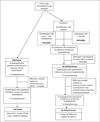Delirium superimposed on dementia: accuracy of nurse documentation
- PMID: 21761816
- PMCID: PMC3299009
- DOI: 10.3928/00989134-20110706-01
Delirium superimposed on dementia: accuracy of nurse documentation
Abstract
Delirium is an acute, fluctuating confusional state that results in poor outcomes for older adults. Dementia causes a more convoluted course when coexisting with delirium. This study examined 128 days of documentation to describe what nurses document when caring for patients with dementia who experience delirium. Nurses did not document that they recognized delirium. Common descriptive terms included words and phrases indicating fluctuating mental status, lethargy, confusion, negative behavior, delusions, and restlessness. Delirium is a medical emergency. Nurses are in need of education coupled with clinical and decisional support to facilitate recognition and treatment of underlying causes of delirium in individuals with dementia.
Copyright 2012, SLACK Incorporated.
Figures
References
-
- Allen D. The nursing-medical boundary: A negotiated order? Sociology of Health & Illness. 1997;19:498–520.
-
- American Association of Colleges of Nursing. Nursing shortage. 2011 Retrieved from http://www.aacn.nche.edu/media/factsheets/nursingshortage.htm.
-
- American Psychiatric Association. Diagnostic and statistical manual of mental disorders. 4th ed. Washington, DC: Author; 2000. text rev.
-
- Bellelli G, Speciale S, Barisione E, Trabucchi M. Delirium subtypes and 1-year mortality among elderly patients discharged from a post-acute rehabilitation facility. Journals of Gerontology. Series A, Biological Sciences and Medical Sciences. 2007;62:1182–1183. - PubMed
-
- Blessed G, Tomlinson BE, Roth M. The association between quantitative measures of dementia and of senile change in the cerebral grey matter of elderly subjects. British Journal of Psychiatry. 1968;114:797–811. - PubMed
Publication types
MeSH terms
Grants and funding
LinkOut - more resources
Full Text Sources
Medical


